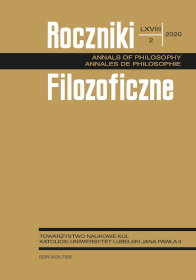The Three Faces of the Cogito: Descartes (and Aristotle) on Knowledge of First Principles
Abstract
With the systematic aim of clarifying the phenomenon sometimes described as “the intellectual apprehension of first principles,” Descartes’ first principle par excellence is interpreted before the historical backcloth of Aristotle’s Posterior Analytics. To begin with, three “faces” of the cogito are distinguished: (1) the proto-cogito (“I think”), (2) the cogito proper (“I think, therefore I am”), and (3) the cogito principle (“Whatever thinks, is”). There follows a detailed (though inevitably somewhat conjectural) reconstruction of the transition of the mind from (1) via (3) to (2) and back again to (3). What emerges is, surprisingly, a non-circular, non-logical, and ultimately non-mysterious process by which first principles implicitly contained in a complex intuition are gradually rendered explicit (and, if abstract, grasped in their abstract universality). This process bears a striking family resemblance to that intuitive induction (“grasping the universal in the particular”) which Aristotle scholars have distinguished from empirical forms of induction.
References
Ashworth, Earline J. 1972. “Descartes’ Theory of Clear and Distinct Ideas.” In Cartesian Studies, edited by Ronald J. Butler. Oxford: Basil Blackwell.
Aristotle. 1949. Prior and Posterior Analytics. Revised text with introduction and commentary by William David Ross. Oxford University Press. Cited as Ross 1949 with page number.
Aristotle. 1966. Posterior Analytics and Topica. Loeb Classical Library 391. Translated by Hugh Tredennick and Edward S. Forster. Harvard University Press and William Heinemann Ltd.
Aristotle. 1975. Aristotle’s Posterior Analytics. Translated with notes by Jonathan Barnes. Oxford: Oxford University Press. Cited as Barnes 1975.
BonJour, Laurence. 1985. The Structure of Empirical Knowledge. Cambridge, MA: Harvard University Press.
BonJour, Laurence. 1998. In Defense of Pure Reason. Cambridge: Cambridge University Press.
BonJour, Laurence. 2010. Epistemology. Classical Problems and Contemporary Responses. 2nd ed. Lanham: Rowman & Littlefield Publishers.
Burnyeat. 1981. “Aristotle on Understanding Knowledge.” In Aristotle on Science: The Posterior Analytics, edited by Enrico Berti. Padova: Editrice Antenore.
Descartes, René. 1984–91. The Philosophical Writings of Descartes. Translated and edited by John Cottingham, Robert Stoothoff, Dugald Murdoch, and Anthony Kenny. 3 vols. Cambridge: Cambridge University Press.
Doney, Willis. 1955. “The Cartesian Circle.” Journal of the History of Ideas 16 (3): 324–38.
Heath, Thomas. 1949. Mathematics in Aristotle. Oxford: Oxford University Press.
Hume, David. 1990. An Enquiry Concerning Human Understanding. La Salle, IL: Open Court.
Gewirth, Alan. 1968. “Clearness and Distinctness in Descartes.” In Descartes. A Collection of Critical Essays, edited by Willis Doney. Notre Dame: Notre Dame University Press.
Kahn, Charles H. 1981. “The Role of NOUS in the Cognition of First Principles in Posterior Analytics II 19.” In Aristotle on Science: The Posterior Analytics, edited by Enrico Berti. Padova: Editrice Antenore.
Lee, Henry D. 1935. “Geometrical Method and Aristotle’s Account of First Principles.” The Classical Quarterly 29 (2): 113–24.
Lesher, James H. 1973. “The Meaning of NOUS in the Posterior Analytics.” Phronesis 18 (1): 44–68.
McKeon, Richard. 1966. The Basic Works of Aristotle. Edited and with an introduction by Richard McKeon. New York: Random House.
Menn, Stephen. 1995. “The Greatest Stumbling Block: Descartes Denial of Real Qualities.” In Descartes and His Contemporaries: Meditations, Objections, and Replies, edited by Roger Ariew and Marjorie Grene. Chicago: University of Chicago Press.
Miles, Murray. 1999. Insight and Inference. Descartes’s Founding Principle and Modern Philosophy. Toronto and Buffalo: University of Toronto Press.
Nolan, Lawrence, ed. 2015. The Cambridge Descartes Lexicon. New York: Cambridge University Press.
Normore, Calvin. 1986. “Meaning and Objective Being: Descartes and his Sources.” In Essays on Descartes’ Meditations, edited by Amélie Oksenberg Rorty. Berkeley, CA: University of California Press.
Nussbaum, Martha C. 1986. The Fragility of Goodness. Luck and Ethics in Greek Tragedy and Philosophy. Cambridge: Cambridge University Press.
Quine, Willard van Orman. 1963. “Two Dogmas of Empiricism.” In From a Logical Point of View. New York and Evanston: Harper and Row Publishers.
Strawson, P. F. 1966. The Bounds of Sense. An Essay on Kant’s Critique of Pure Reason. London: Methuen.
Von Fritz, Kurt. 1964. Die Epagōgē bei Aristoteles. Munich: Verlag der Bayerischen Akademie der Wissenschaften (C.H. Beck Verlagsbuchhandlung).
Wells, Norman J. 2008. “Material Falsity in Descartes, Arnauld, and Suarez. Journal of the History of Philosophy 22 (1): 25–50.
Wilson, Margaret. 1978. Descartes. London: Routledge.
Wilson, Margaret. 1990. “Descartes on the Representationality of Sensation.” In Central Themes in Early Modern Philosophy (essays presented to Jonathan Bennett), edited by Jan A. Cover and Mark Kulstad. Indianapolis, IN: Hackett Publishing Co.
Copyright (c) 2020 Roczniki Filozoficzne

This work is licensed under a Creative Commons Attribution-NonCommercial-NoDerivatives 4.0 International License.





